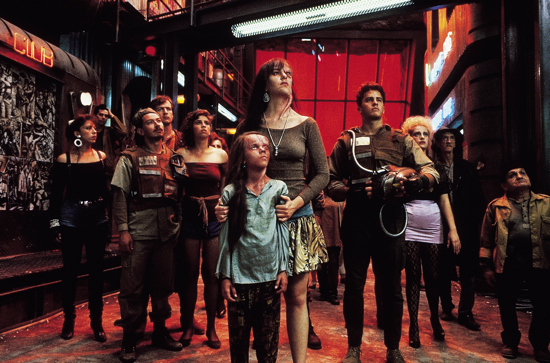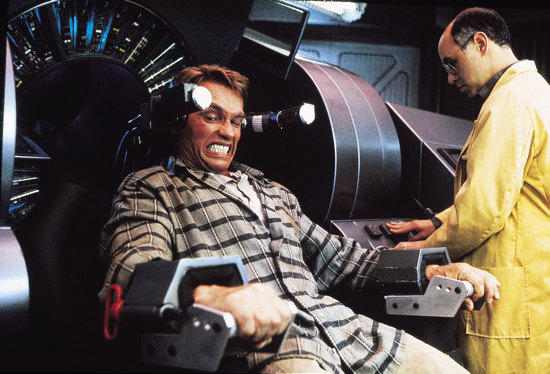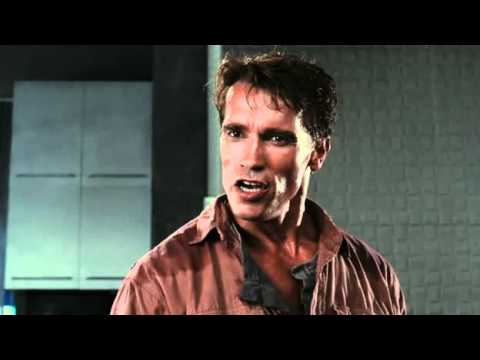Remake season is upon us once again and this time the fashion will be for ‘reimagining’ idiosyncratic Dutch director Paul Verhoeven’s trinity of science fiction triumphs. First up is the August release of Len Wiseman’s all-new Total Recall starring Colin Farrell as Doug Quaid, Wiseman’s missus Kate Beckinsale as Quaid’s ‘complicated’ wife and Jessica Biel as the dreamy Melina. Instinct suggests it will be crap, over-produced, over-graded pedestrian nonsense much like the rest of Wiseman’s output to date, but then not only did I think Underworld was a stinker, but I am a massive fan of Verhoeven’s original, squib-packed take on a short story by the seemingly ubiquitous Philip K Dick.
Dick is to metaphysical science fiction cinema as Lovecraft is to eldritch horror, the most adapted author in his field. The most common adaptations take a short story of several pages and blow the concept up to movie length and, like Lovecraft, there have been numerous other picture that have been enormously influenced by his work without specifically acknowledging the debt. The plot of The Terminator for example (and all the sequels), takes its cue from the Dick short story ‘Second Variety’. Unfortunately, a third parallel exists between Dick and Lovecraft in that the adaptations of their works tend to fall short of the source material. The first obvious exception is Blade Runner. The second is the first movie adaptation of ‘We Can Remember It For You Wholesale’, Paul Verhoeven’s Total Recall.
When science fiction cinema from the last three decades or so is evaluated as a whole, there are certain lines of lineage that indicate increased levels of quality, if not necessarily commercial success. Blade Runner was of course derided on its original release but found an audience over subsequent years and is now rightly revered. Ridley Scott’s direction in conjunction with a loose but thematically faithful screen adaptation of Dick’s material and the phenomenally artful design eye of futurist Syd Mead ensured Blade Runner‘s lasting appeal, even if it went unrecognised at the time.
Total Recall on the other hand was a phenomenal success on release, due in no small part to star Arnold Schwarzenegger. Arnold was approaching his career apogee with Terminator 2: Judgement Day (by way of Kindergarten Cop) just around the corner, but Total Recall was his biggest box office smash to date and it cemented his status as an A-list superstar. To the casual observer and/or hardcore Dick fan the choice of Arnold as protagonist in such a story may seem unlikely but his wooden, yet undeniably charismatic presence works well for the character of Doug Quaid. Quaid is one of three things at any time during the movie: a bland, blue collar construction worker; a mind-wiped secret agent with astonishing levels of physical prowess and killing skills, but a black hole where his mind should be; or a dream identity being experienced by the unfortunate recipient of an accidentally induced schizoid embolism. Quaid is an example of the common science fiction plot device (extremely common in Dick fiction), the dislocated man. We the audience identify with Quaid (or Neo or Jason Bourne) and vicariously experience their journey of discovery as the intricate plot unravels and our protagonist brutally kicks the living snot out of the shadowy villains and their henchmen.
I say ‘brutally’ because the violence in Total Recall is, even today, utterly brutal and with good reason. Several lines of lineage converged within the production of this film to ensure that Quaid’s journey was not just brain-tangling, but visceral and extraordinarily violent. Paul Verhoeven had already made one foray into the science fiction field with 1987’s heavily satirical (and Judge Dredd-inspired) RoboCop and would go on to direct the deliriously, preposterously, brilliantly violent Starship Troopers a few years later. RoboCop took the art of squibs (simulated blood-spurting bullet wounds) to a previously unimagined level and gave audiences two of the most graphic and bloody deaths ever to grace the silver screen. In these days of CGI squibbing is a dying art, but in both RoboCop and Total Recall the man in charge of the gore and physical make-up effects was Rob Bottin, the genius behind numerous ’80s and ’90s scare-a-thons including John Carpenter’s The Thing and David Fincher’s Se7en. This beautiful conjunction of star, director and artist converged upon a Philip K Dick adaptation penned by the late, great Dan O’Bannon, along with his regular collaborator Ronald Shusett. O’Bannon’s writing in general was always sci-fi/horror-centric and his screenwriting career was drenched particularly heavily in both Lovecraft and Dick (Philip K), both in terms of influence and in shaping direct adaptations of their works.

It is slightly strange to look back on Total Recall, an Arnold Schwarzenegger star vehicle made at the close of the ’80s, and see it as one of the last shining examples of the combined arts of direction, writing and practical visual effects as applied to cranial science fiction. Stranger still, but very much to the star’s credit, Total Recall was a pet project of Schwarzenegger’s and it was his clout that ensured the budget necessary to tell the story. When Verhoeven was approached to direct, Schwarzenegger was a non-negotiable part of the package. Verhoeven brought Rob Bottin to the table, gave Sharon Stone her big break as Quaid’s knife-savvy wife Lori and added a couple of excellent villains in Vilos Cohaagen (Ronny Cox, essentially reprising his role as soulless, corporate monster Dick Jones in RoboCop) and his henchman Richter (Michael Ironside). The star turn, however, remains Schwarzenegger, who delivers probably his most nuanced onscreen role, although it often took up to 40 takes to achieve the intended results. It is easy to forget now, but back in 1990 he was THE quintessential action star and Total Recall indicated for a moment that his films may take on a new level of complexity and depth. This is a film that allows a lot of thought, even though it may not demand it. Unlike Inception, for example, it is easy to take Total Recall at face value and enjoy the thrills and spills without looking more deeply into the narrative. Should you choose to do the latter, there are enough layers to exercise the grey matter and suggest an entirely different way of viewing the story.
Sadly, this was the end of Schwarzenegger’s brief dalliance with the mind-bending and the following year would see the release of Terminator 2: Judgement Day. In one world-conquering package James Cameron ushered in a new era of visual effects and a frustrating dumbing down of intellectual content in commercial science fiction movies. Challenged only briefly in 1997 by Verhoeven’s own Starship Troopers, the trend continued further with George Lucas’s tedious Star Wars prequels and reached a sad nadir three years ago with Cameron’s mind-bogglingly successful Dances With Wolves/Pocahontas/Colonial Marines mash-up Avatar. For Starship Troopers, Verhoeven reunited with RoboCop screenwriter Ed Neumeier to create a satirical take on the overtly right-wing and hawkish 1950s novel by Robert Heinlein. He also hooked up again with RoboCop‘s ED-209 animator Phil Tippet and they successfully combined cutting edge digital compositions with meticulously crafted practical effects to a spectacular degree that has only been surpassed since by the work of Peter Jackson’s Weta Workshop on The Lord Of The Rings trilogy.
All three of Verhoeven’s ventures into science fiction were pitch-perfect, multi-layered pieces that may have been overshadowed in many minds by the levels of violence contained within, but the viscerality and hyper-realism of the action is crucial to the overall tone of the director’s approach to the genre. In Total Recall‘s case the sudden transformation of Doug Quaid from a slightly dozy, bored husband into a lethal killing machine is a shot of adrenaline in the arm of both the movie and the audience, because most of us at some point in our lives have fantasised, if only fleetingly, about beating a group of antagonists into the dirt and standing over their broken bodies as the last dying act of their fascist, bullying brains is to see me, their conqueror, standing and staring in amazement at the power of my own hands, which I name Gog and Magog, destroyers of worlds!
Or perhaps that’s just me. Either way it’s a conceit that has been used numerous times since to great success, most memorably in The Bourne Identity but never more effectively than in Total Recall. The escalating conflict, particularly the gruesome treatment of mutant resistance leader Kuato and the wildly over-the-top retribution for the villains, enables the story to achieve its desired end on two distinctly different levels. It’s not Kafka, but it is all too rare in this kind of movie over 20 years later.
Unsurprisingly, the imminent remake is eschewing the bloody violence of the original in order to embrace a more commercially viable film classification rating. The director Len Wiseman learned his trade under the stewardship of Roland Emmerich, creator of commercial, crowd-pleasing (or otherwise) guff such as Independence Day, the 1998 Godzilla and a vacuous parade of computer animated disaster movies. Wiseman made his name as a director by creating the Underworld franchise and transforming John McClane from Die Hard action movie icon into a passenger aboard what was little more than a tired and washed-out computer game in Die Hard 4.0. Small comfort may be taken from the involvement of writers Kurt Wimmer, a man with a half-decent track record in the genre when left to his own devices, and James Vanderbilt, screenwriter of David Fincher’s Zodiac. Vanderbilt is also penning the upcoming RoboCop remake and, if that isn’t enough, Starship Troopers is undergoing a makeover too. <a href="http://blogs.indiewire.com/theplaylist/producer-of-unwanted-starship-troopers-remake-says-new-film-will-be-less-violent-more-patriotic-than-original-20120627#.UAEs2hzxZFk
" target="out">According to the producers, who are also behind the new Total Recall, this version will take a path that runs much closer to Heinlein’s original novel in that it will be deeply patriotic and abandon Verhoeven and Neumeier’s ‘agenda’ in creating a subversive examination of the themes of the source material and the attractions of fascism.
Sigh. Paul Verhoeven, please come back to science fiction. It needs you. Damn it I NEED YOU.
Containing both Blu-ray and DVD versions, Total Recall: Ultimate Rekall Edition is released on Monday July 16 by StudioCanal.




